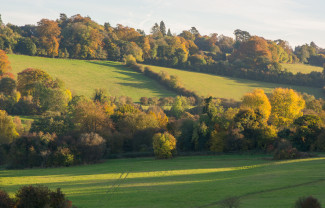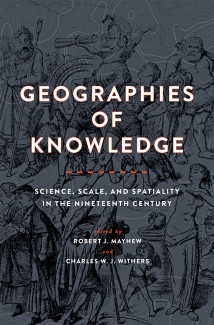
Johns Hopkins UniversityEst. 1876
America’s First Research University
Now Browsing:
Thinking Geographically about Science and Knowledge—and Why It Matters

It is hard to distil any work and its implications to an essence. But, often, we have to: time may be pressing; audiences (and funders) need convincing—and sometimes quickly. One common feature of graduate training in UK universities in recent years, for example, has been the rise of the ‘Three Minute Thesis’ competition. To a mixed audience (experts and non-experts, peers and not) PhD students present their research, their principal findings, the implications of their work. Three minutes and not a second more.
It is equally difficult to compress the arguments of a book—not into three minutes, but into three sentences. But here goes. Geographies of Knowledge is about the spatial dimensions of science, principally in the nineteenth century. Science (as do all forms of knowledge actually), has a geography—it is situated and shaped somewhere, and, in its moving from one place and audience to another, may be transformed, ‘read’ and so understood differently in different places. Because this is so, it is important when explaining both the content of the science in question and its political purchase that attention is paid to geographical scale.
In Geographies of Knowledge our contributors, spanning history, geography and theology, take the reader on a tour of some of the implications of these three terse statements. Take climate science or the geographies of climate change as an example. Concerns about this were manifest in a variety of ways in the nineteenth century. In Britain’s colonies and for many in the United States, authorities’ anxieties about desiccation and deforestation were from the 1860s onwards very real. And what was known about climate change as an historical phenomenon was because climate change was examined as a geographical phenomenon: certain sites and places were used (as they are today) to advance arguments over a heating earth, desertification, glacier retreat and so on. At the same time, the effects of climate’s change were not felt equally in all places, for which also read by all persons equally.

Of course, climate science has a geography today. It is a global issue, affecting all human beings on the planet. But its effects are not felt equally (or even recognised) internationally. Differences between nations may also be differences within nations. Differences within nations may be the result of different institutions, different people, differences in scientific practice. In the explanation of things, scale matters—not in any strictly hierarchical sense—but in terms of the social relations between people and their given practices of knowing, in place and over space. Science is a social product and made, as our contributors show, in particular social and spatial settings. That is true whether the subject in question was the theories of Charles Darwin and their differential uptake in nineteenth-century America or the still-different meanings with which Darwin was freighted on the other side of the Atlantic in Belfast. It is true if we attend to the politics and economics of Thomas Malthus’s infamous principle of population and its distinct mooring in his Surrey upbringing, or to botanical collecting in the Far East and the imperial-cum-gendered politics thereof. Science is always grounded.
Thinking geographically about science—about all forms of knowledge—is to acknowledge that questions of place and venue are vital in understanding the making of that science, and vital to understanding the social and political contours of its acceptance. It is, quite simply, to recognise that where questions are vital to answering what, why and how questions. Scale, site, network, connection, dissemination: space may not be the final frontier for historians of science, but as Geographies of Knowledge demonstrates, daring to tread its territory and overleap the disciplinary boundaries of the imagination leads to new insights into the fact that how and where science functions (and, indeed, fails to function) amount to two angles on the same question.
Order Geographies of Knowledge: Science, Scale, and Spatiality in the Nineteenth Century – published on August 18, 2020 – at the following link: https://jhupbooks.press.jhu.edu/title/geographies-knowledge
Robert J. Mayhew is a professor of historical geography and intellectual history at the University of Bristol. He is the author of Malthus: The Life and Legacies of an Untimely Prophet. Charles W. J. Withers is professor emeritus at the University of Edinburgh and Geographer Royal for Scotland. He is the author of Zero Degrees: Geographies of the Prime Meridian. Together, Mayhew and Withers are the editors of Geographies of Knowledge: Science, Scale, and Spatiality in the Nineteenth Century.

It is equally difficult to compress the arguments of a book—not into three minutes, but into three sentences. But here goes. Geographies of Knowledge is about the spatial dimensions of science, principally in the nineteenth century. Science (as do all forms of knowledge actually), has a geography—it is situated and shaped somewhere, and, in its moving from one place and audience to another, may be transformed, ‘read’ and so understood differently in different places. Because this is so, it is important when explaining both the content of the science in question and its political purchase that attention is paid to geographical scale.
In Geographies of Knowledge our contributors, spanning history, geography and theology, take the reader on a tour of some of the implications of these three terse statements. Take climate science or the geographies of climate change as an example. Concerns about this were manifest in a variety of ways in the nineteenth century. In Britain’s colonies and for many in the United States, authorities’ anxieties about desiccation and deforestation were from the 1860s onwards very real. And what was known about climate change as an historical phenomenon was because climate change was examined as a geographical phenomenon: certain sites and places were used (as they are today) to advance arguments over a heating earth, desertification, glacier retreat and so on. At the same time, the effects of climate’s change were not felt equally in all places, for which also read by all persons equally.

Of course, climate science has a geography today. It is a global issue, affecting all human beings on the planet. But its effects are not felt equally (or even recognised) internationally. Differences between nations may also be differences within nations. Differences within nations may be the result of different institutions, different people, differences in scientific practice. In the explanation of things, scale matters—not in any strictly hierarchical sense—but in terms of the social relations between people and their given practices of knowing, in place and over space. Science is a social product and made, as our contributors show, in particular social and spatial settings. That is true whether the subject in question was the theories of Charles Darwin and their differential uptake in nineteenth-century America or the still-different meanings with which Darwin was freighted on the other side of the Atlantic in Belfast. It is true if we attend to the politics and economics of Thomas Malthus’s infamous principle of population and its distinct mooring in his Surrey upbringing, or to botanical collecting in the Far East and the imperial-cum-gendered politics thereof. Science is always grounded.
Thinking geographically about science—about all forms of knowledge—is to acknowledge that questions of place and venue are vital in understanding the making of that science, and vital to understanding the social and political contours of its acceptance. It is, quite simply, to recognise that where questions are vital to answering what, why and how questions. Scale, site, network, connection, dissemination: space may not be the final frontier for historians of science, but as Geographies of Knowledge demonstrates, daring to tread its territory and overleap the disciplinary boundaries of the imagination leads to new insights into the fact that how and where science functions (and, indeed, fails to function) amount to two angles on the same question.
Order Geographies of Knowledge: Science, Scale, and Spatiality in the Nineteenth Century – published on August 18, 2020 – at the following link: https://jhupbooks.press.jhu.edu/title/geographies-knowledge
Robert J. Mayhew is a professor of historical geography and intellectual history at the University of Bristol. He is the author of Malthus: The Life and Legacies of an Untimely Prophet. Charles W. J. Withers is professor emeritus at the University of Edinburgh and Geographer Royal for Scotland. He is the author of Zero Degrees: Geographies of the Prime Meridian. Together, Mayhew and Withers are the editors of Geographies of Knowledge: Science, Scale, and Spatiality in the Nineteenth Century.

Login to View & Leave Comments
Login to View & Leave Comments


